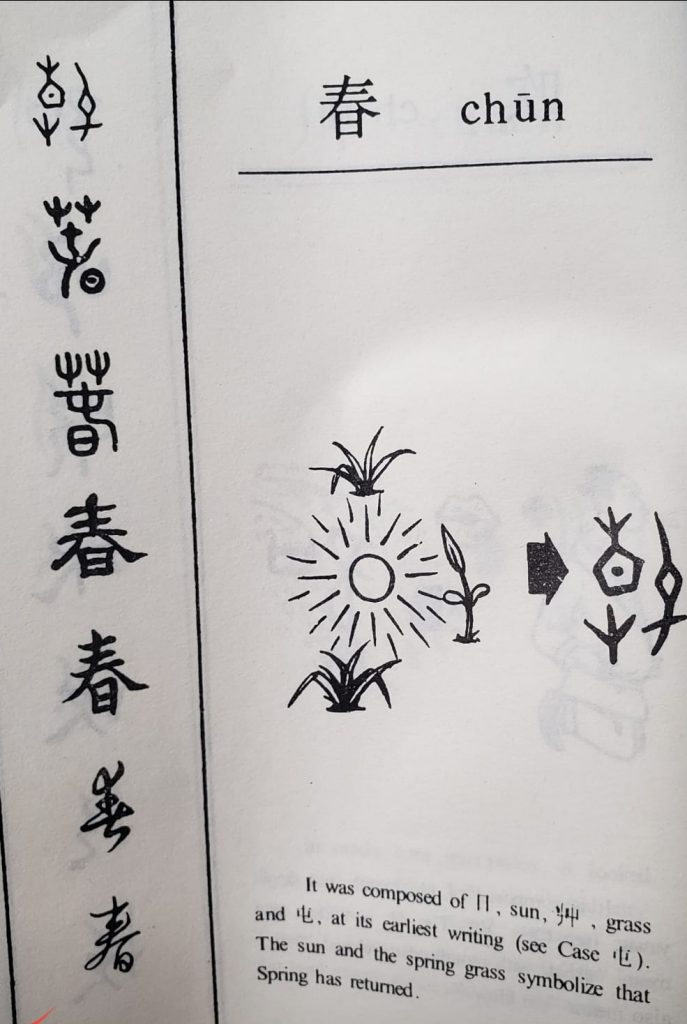Due to geographical proximity and historical development, Chinese (Mandarin) has close connections with other Asian languages, such as Japanese and Korean. These languages have also been significantly influenced by Chinese. Therefore, mastering Chinese not only benefits language learners directly but also serves as a valuable foundation for learning other languages. Isn’t it a win-win situation? Come and learn Chinese now!
由于地缘关系和历史发展,中文和其他亚洲语言关系密切,像是日语、韩语等也都深受中文(华语)影响甚深。因此掌握中文,对其他语言的学习也有着重要的辅助作用,是不是一举数得? 快来学中文吧!!

< Chinese Learning One Word Everyday~【春】(chūn) 每日学一字>
It was composed of sun and grass and 屯, at its earliest writing. The sun and the spring grass symbolize that Spring has returned.
最早见于甲骨文中,是由太阳/草/屯组成,其本义是草木的种子生根发芽,太阳和春草象征春天回来了,其后延伸至以“春”字作为一年四季的第一季名。<出自于汉字五百例>

造句Sentence-making
- There is an aroma suggestive of spring flowers in the room.
这房间里有一种香气,使人想起春天的花朵。
- Spring rains bring summer flowers.
春雨带来了夏日百花。

Why You Should Learn Chinese with One Word a Day: It’s Easy to Learn Mandarin Effectively
Are you interested in learning a new language? Have you considered Mandarin Chinese? With over a billion native speakers worldwide, Mandarin is the most spoken language globally. Not only does it open doors to a rich and diverse culture, but it also enhances your career prospects in the global market. However, learning Mandarin can seem daunting due to its complexity. But what if we told you that you could learn Mandarin online free and effectively by learning just one word a day? Sounds intriguing, right? Let’s delve into why this approach works.
The Power of One Word a Day
Learning one word a day might seem like an overly simplistic approach to mastering Mandarin. However, this method has proven effective for many language learners. By focusing on one word each day, you give yourself the chance to fully understand its meaning, pronunciation, and usage in different contexts. This method allows for deep learning rather than superficial memorization.
Moreover, this approach makes learning manageable and less overwhelming. Instead of trying to cram hundreds of words into your brain at once (which often leads to forgetting most of them), focusing on one word per day makes the process more enjoyable and less stressful.
How Learning One Word a Day Boosts Retention
When we learn something new, our brain needs time to process and store that information. By limiting your learning to one new word per day, you’re giving your brain ample time to absorb the new information effectively.
Furthermore, repetition is key in language acquisition. By revisiting the same word throughout the day—reading it, writing it down, using it in sentences—you reinforce its meaning and usage in your memory. This way, when you encounter that word again in future lessons or real-life situations, you’ll be able to recall it quickly.
Leveraging Technology: Learn Mandarin Online Free
In today’s digital age, there are numerous resources available to learn Mandarin online free. These platforms offer a variety of learning materials, including video lessons, interactive exercises, and even one-on-one tutoring. Many of these resources also incorporate the “one word a day” approach into their curriculum.
For instance, some apps send you a daily notification with a new Mandarin word to learn. They provide the word’s meaning, pronunciation (often with audio clips), and examples of its use in sentences. This way, you can practice the new word throughout your day—during your commute, on your lunch break, or before bed.
Consistency is Key: Making Daily Learning a Habit
The key to this method’s success is consistency. Learning one word per day might not seem like much progress in the short term. However, over time these small daily efforts accumulate into substantial knowledge.
Think about it: If you learn one new Mandarin word each day for a year, you’ll have learned 365 words by the end of that year! That’s enough vocabulary to understand basic conversations and texts.
To ensure consistency, make your daily learning session part of your routine. Set aside a specific time each day for learning your new word—perhaps over morning coffee or right before bed. The more consistent you are with this habit, the more effective it will be in helping you learn Mandarin.
Conclusion: Embrace Slow and Steady Learning
Learning Mandarin—or any language—is not about speed; it’s about understanding and retention. By focusing on one word per day and using free online resources to aid your learning process, you can effectively learn Mandarin at your own pace without feeling overwhelmed.
Remember that language learning is a journey—not a race. Embrace this slow and steady approach and watch as your Mandarin skills gradually improve each day! Practice and get support learning Mandarin from experienced teachers at online Chinese schools like EverydayMandarin.org.
